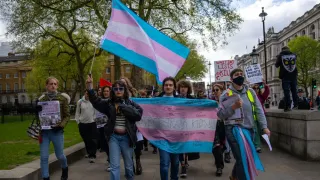
5 hours ago
Gay Asylum Seeker Andry Hernández Romero Details Survival After U.S.-Led Deportation to Salvadoran Prison
READ TIME: 3 MIN.
Andry Hernández Romero, a Venezuelan national who identifies as gay, fled his home country seeking refuge from escalating anti-LGBTQ+ violence and political instability. Upon arriving in the United States, Hernández Romero requested asylum, hoping to find safety and acceptance. Instead, he became ensnared in a system that would ultimately result in his deportation to El Salvador—a country with its own legacy of anti-LGBTQ+ violence and prison abuse .
According to Hernández Romero’s recent interview with Tim Miller, U.S. Immigration and Customs Enforcement (ICE) officers misled him and other detainees about their destination. Hernández Romero reported that officials staged travel delays in Honduras, only to ultimately deliver him and others to San Salvador, where he was transferred directly to the Terrorism Confinement Center (CECOT)—a maximum-security Salvadoran prison notorious for its harsh conditions and alleged human rights abuses .
Legal advocates and members of Congress have highlighted the lack of due process in Hernández Romero’s case. His asylum hearing was abruptly cancelled, and his legal team was unable to intervene before deportation proceeded. Congressional Democrats have since demanded proof of life and accountability, noting that Hernández Romero was flagged by ICE contractors based solely on tattoos of crowns labeled “Mom” and “Dad”—not on any criminal record or gang affiliation .
Inside CECOT, Hernández Romero endured what he described as “unconscionable abuse.” The prison is infamous for overcrowding, violence, and lack of medical care—a situation exacerbated for LGBTQ+ individuals, who often face targeted harassment and isolation. Hernández Romero recounted the psychological toll of his confinement but emphasized the role of faith, humor, and empathy in helping him survive. He expressed gratitude for the support provided by other detainees and by advocates outside the prison, particularly those in the LGBTQ+ community who rallied for his release and demanded accountability from U.S. and Salvadoran authorities .
Hernández Romero’s case drew attention during Pride Month, as activists and lawmakers stressed the importance of highlighting LGBTQ+ asylum seekers’ struggles. Representative Robert Garcia stated, “Pride Month is an opportunity to highlight his story even more” and emphasized the need for transparency and humane treatment for all LGBTQ+ migrants .
Hernández Romero’s ordeal has prompted calls for reform at multiple levels. Immigration advocates are urging the U.S. government to review deportation protocols, especially those affecting LGBTQ+ asylum seekers. Legal organizations, including the Immigrant Defenders Law Center, have appealed the dismissal of Hernández Romero’s asylum case and continue to press for oversight and accountability .
The rally for Hernández Romero outside the U.S. Supreme Court earlier this summer amplified concerns about the intersection of immigration policy and LGBTQ+ rights. Activist Lindsay Toczylowski likened Hernández Romero’s experience to historical injustices, including the internment of Japanese Americans during World War II. Congressman Mark Takano described Hernández Romero as a “political prisoner, denied basic rights under a law that should have stayed in the past,” underscoring the urgent need for legal and humanitarian intervention .
Despite his challenges, Hernández Romero remains committed to rebuilding his life and advocating for others. In his conversation with Tim Miller, he reflected on the importance of mercy, empathy, and solidarity. His story serves as a potent reminder of the resilience within the LGBTQ+ community and the ongoing need for justice and compassion in immigration policy .
As Pride celebrations continue worldwide, the case of Andry Hernández Romero stands as an urgent call for systemic change—ensuring that LGBTQ+ asylum seekers are treated with dignity and humanity, and that their stories are heard in the halls of power and across communities.






